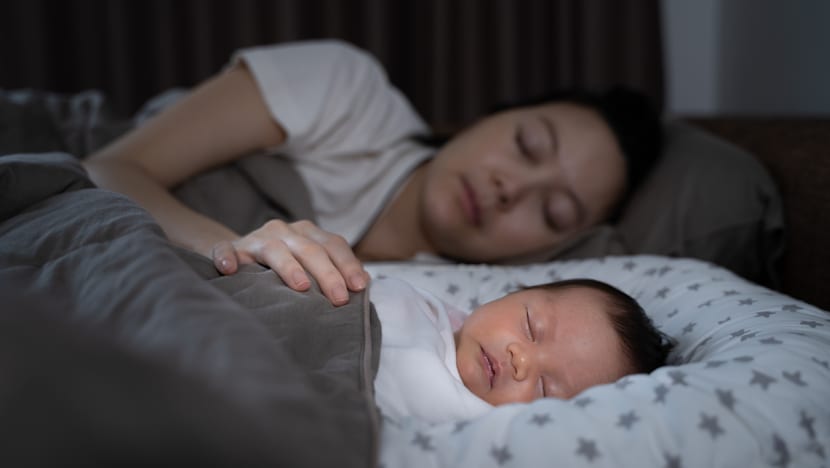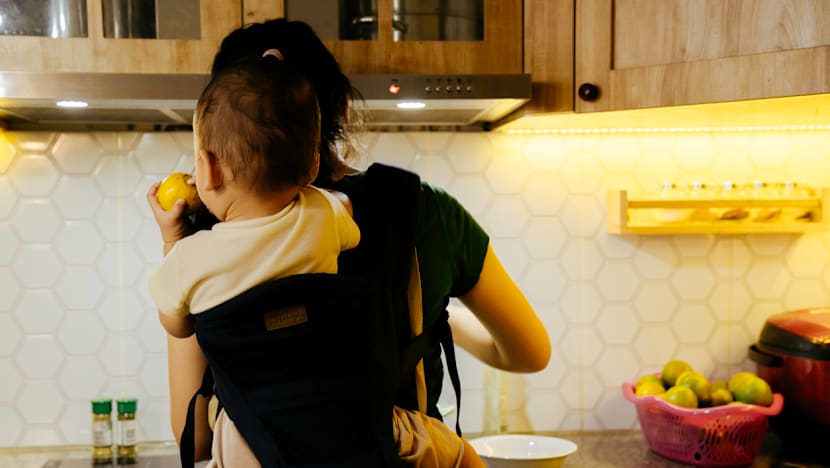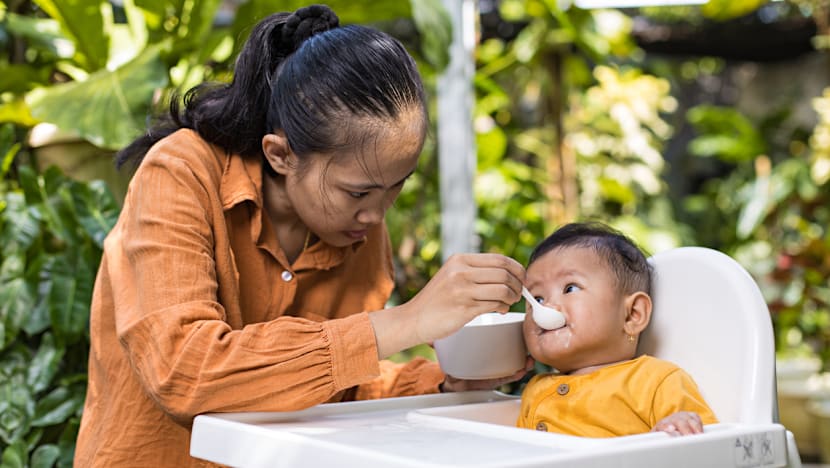'So, so, so tired': The risks and realities of maids caring for babies through the night
Behind the jailing of two domestic helpers for baby abuse lies deeper issues around a labour arrangement one expert referred to as "where the home is a worksite and the worksite is a home".

It is common for parents, especially new ones, to hire domestic helpers specifically to care for their babies at night, maid agencies said. (Illustration: CNA/Lydia Lam)

This audio is generated by an AI tool.
SINGAPORE: In close to two decades of working in Singapore, domestic helper Ms Marie has struggled with the demands of caring for the children of her employers.
The 48-year-old Indonesian, who asked to go by a pseudonym, once had to sleep with twin babies and go without rest during the day, as she also had to cook and clean. Her weight dropped from 52kg to 46kg in 10 months.
With her next employer, it was waking up two to four times a night to feed a baby, change his diapers and put him back to sleep.
Ms Marie said she felt "so, so, so tired and sleepy" all the time. But she never considered quitting – not with two children of her own to support, on top of bills to settle and loans to repay.
Instead, she just tried to finish her work quickly before asking for permission to nap for an hour during one of the baby's naptimes. Ms Marie's employer turned this down at first, but changed her mind after witnessing her helper fall asleep in the middle of lunch.
Earlier in 2025, the alleged sleep deprivation of two different maids proved to have far more severe consequences, when they abused babies out of frustration and were jailed as a result.
Non-governmental organisations told CNA that sleep deprivation and its repercussions are a consistent issue for helpers, who are increasingly hired by dual-income families for the specific purpose of caring for children at night. Clearer communication and setting of expectations with employers can benefit all – but going forward, stronger regulation and enforcement actions should also be considered, stakeholders and experts say.
At the Humanitarian Organisation for Migration Economics (HOME), which aids migrant workers in Singapore, more than half of its shelter residents complained of overwork last year. Of these, 30 per cent were caring for babies and young children, said deputy director Prashant Somosundram.
"Many migrant domestic workers tell us they feel constantly tired and anxious which also increases the risk of mistakes or accidents at work," he added.
Domestic helpers who don't get enough rest can also suffer higher stress levels, poorer mental health and reduced alertness among other things, said Mr Michael Lim, executive director of the Centre for Domestic Employees (CDE), an initiative by the National Trades Union Congress.

"WHERE THE HOME IS A WORKSITE"
A single mother of boys aged two and five, who only wanted to give her name as Ms Emily, told CNA she hired a helper to look after her younger son from birth, including sleeping with him and providing night feeds.
The woman, who works full-time in an industrial company, said it was "too tiring to care for both boys". Among the parents CNA spoke to, their fatigue - along with a lack of familial support, or residential space - were commonly cited factors in having helpers share rooms with their kids.
Raymond Maids Employment Agency has seen increased demand over the five past years for helpers to provide childcare throughout day and night.
"It has always been a common request, which makes sense given that most parents work regular office hours in the day," said managing director Matthew Lee, adding that return-to-office mandates have piled on the pressure. “Parents might not have the capacity to attend to the night feeds if they need to wake up early to travel to the workplace."
He said his agency encourages employers to select helpers who are experienced or mentally prepared to share rooms with babies.

Maid agencies told CNA expectations are managed from the outset, with helpers briefed at the source country ahead of deployment, and asked if they are willing to accept night duties.
Homekeeper Maid Agency's director James Yong Yu An said these are also documented in contracts and clarified during interviews with employers.
But HOME's Mr Prashant noted there have been cases where helpers informed prospective employers that they don't wish to sleep with babies or young children, and are promised so, only to "find that they have to once they have commenced employment".
"It is important that potential employers are transparent and truthful about the job scope and sleeping arrangements," he said.
Once employed, it is difficult for helpers to say no to additional tasks and requests, especially due to the power imbalance between them and their employer, Mr Prashant added. "Speaking up about exhaustion can lead to accusations of being uncooperative; termination; and repatriation."
CDE's Mr Lim said it encourages employers and domestic helpers to have clear discussions about rest and caregiving arrangements before and during employment.
Some practical steps include agreeing on explicit rest and work schedules, sharing caregiving responsibilities among household members where possible, allowing compensatory daytime rest or short breaks after night duties, and including rest expectations in employment contracts or settling-in discussions.

International labour migration researcher Kurt W Kuehne pointed to the importance of employers being good communicators.
"They ask questions, they're willing to accept feedback from their employee, and they're open to adjustments," said the sociologist, who has studied domestic workers in Southeast Asia. "When a domestic worker's well-being is prioritised, she can do a better job performing her duties."
He also noted how many employers are not well-prepared for the "complex role of personnel management, especially in this unique labour arrangement, where the home is a worksite and the worksite is a home".
"There is a huge number of online forums for employers to trade advice, and a lot of that advice is mixed. The fact is that many employers turn to anonymous strangers on the internet for help," said Dr Kuehne.
"And they can be overwhelmed by their own busy professional and family lives - especially when they’re parents to young children."
Employers must ensure maids have enough sleep: Manpower Ministry
In response to CNA's queries, a spokesperson from the Ministry of Manpower (MOM) said it encourages employers and domestic helpers to "communicate openly about their roles and expectations", before and during employment.
"Employers are required to establish reasonable working arrangements for migrant domestic workers. If they are required to engage in overnight childcare duties, employers should ensure that migrant domestic workers receive adequate sleep and rest during the daytime, to safeguard their well-being and enable them to perform their duties safely," said the spokesperson.
He said MOM has implemented a suite of measures to support maids in adapting well to households and fostering harmonious relationships with their employers.
Employers must provide their helpers with one rest day a month that "cannot be compensated away". This allows the maids to rest and recharge from work, as well as form support networks outside the household.
All first-time migrant domestic workers are required to attend a settling-in programme when they arrive, where they are taught how to communicate effectively with employers, manage stress and the avenues to seek help.
"MOM also partners with the Centre for Domestic Employees to interview migrant domestic workers twice within the first year of employment to check if they are adjusting well to their new work environment," said the spokesperson.
He said MOM's migrant domestic worker resource hub lists both employer and maid responsibilities, along with tips on open communication and support resources available to workers.
Migrant domestic workers who need help can call MOM's helpline at 1800-339-5505, or non-governmental organisations such as CDE at 1800-2255-233 (a 24-hour line) for advice and support in their native languages, said the spokesperson.
A "TROUBLING" DYNAMIC
HOME's Mr Prashant said the organisation has "very rarely" seen employers give helpers time off in the day to rest, if the night before was taxing for them due to having to care for a young child.
"There are currently no limits on working hours or rest between shifts for live-in domestic workers," he added.
Setting clear guidelines and standards in this space, coupled with enforcement for serious or repeat violations, would "make a real difference", Mr Prashant suggested.
He noted that HOME has been advocating for weekly, 24-hour rest days as well as for domestic helpers to be included in Singapore's Employment Act, for their working hours to be regulated.
Fundamentally, some families depend heavily on maids to fill a care gap, "often at the cost of the worker's well-being", said Mr Prashant.
"The long-term solution lies in affordable childcare, flexible work policies, and recognising that care responsibilities should be shared and not shifted entirely to one vulnerable migrant domestic worker."

Dr Kuehne meanwhile noted that many or even most migrant workers have "a net positive personal experience".
"Salaries are high relative to those in sending countries, the employer provides housing and food, and the out-migration may offer freedom from an unstable or repressive home environment. If you are a migrant domestic worker, perhaps you grow to love your employing family, and they grow to love you," he said.
Still, even in "the very best of circumstances", there is something "inescapably troubling about the industry dynamic", said Dr Kuehne.
"For many migrant domestic workers, the calculation is heartbreaking: Determining that the best way to care for your own child is to leave them behind and care for someone else's. No parent wishes to make this trade."
It is a choice "accepted only under some type of pressure", such as financial, he added. "A wealthier stranger can induce you to care for their children instead ... There is inevitably a huge power difference between employer and domestic worker."
A helper in Singapore, who only wanted to give her name only as Ms Vani, told CNA how she too struggled when her employer gave birth to a second child, and she had to concurrently care for both the newborn and a 20-month-old child, on top of looking after the household.
The Indonesian, 32, slept with both kids and the newborn would wake up every two or three hours, needing milk or a diaper change. When the infant woke up, the toddler would follow suit.
Ms Vani, who is unmarried and has no children of her own, decided to be open with her employer and share her feelings. She was subsequently given an hour to rest in the day while the baby was napping, and her chores were reduced.
"I felt very stressed at that time," she recalled. "Sometimes I thought about quitting my job and looking for a new one, but when I looked at (the children), I (would feel) guilty about leaving them."














